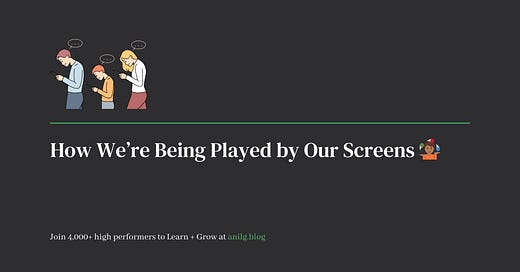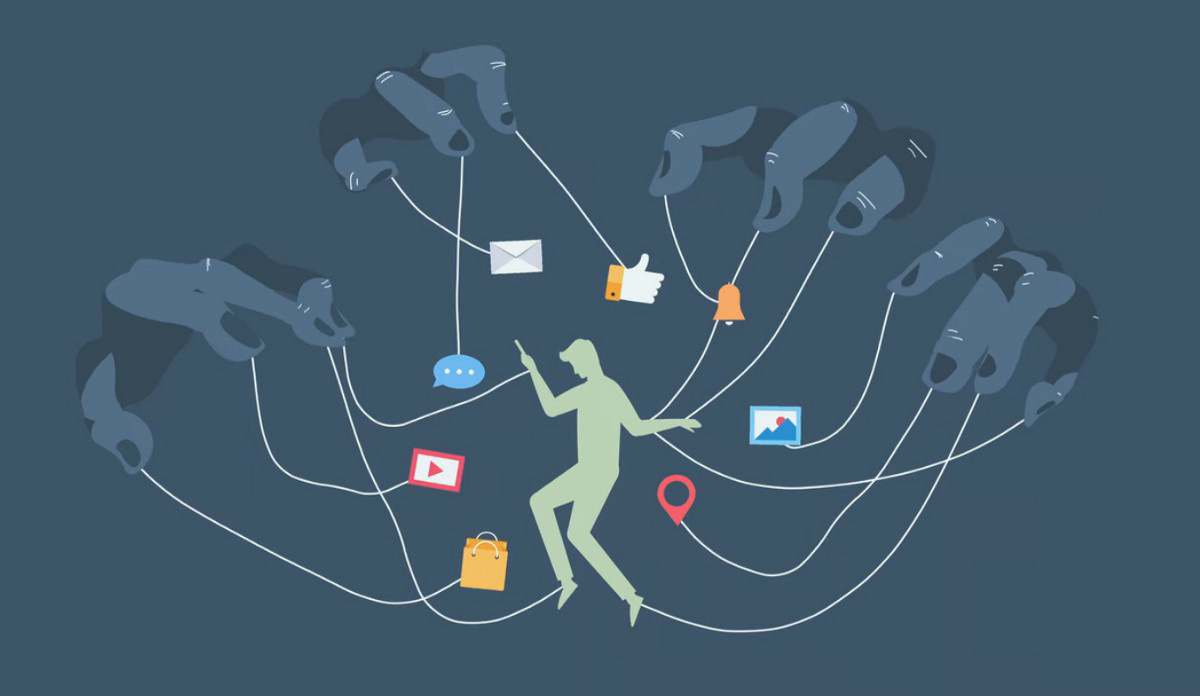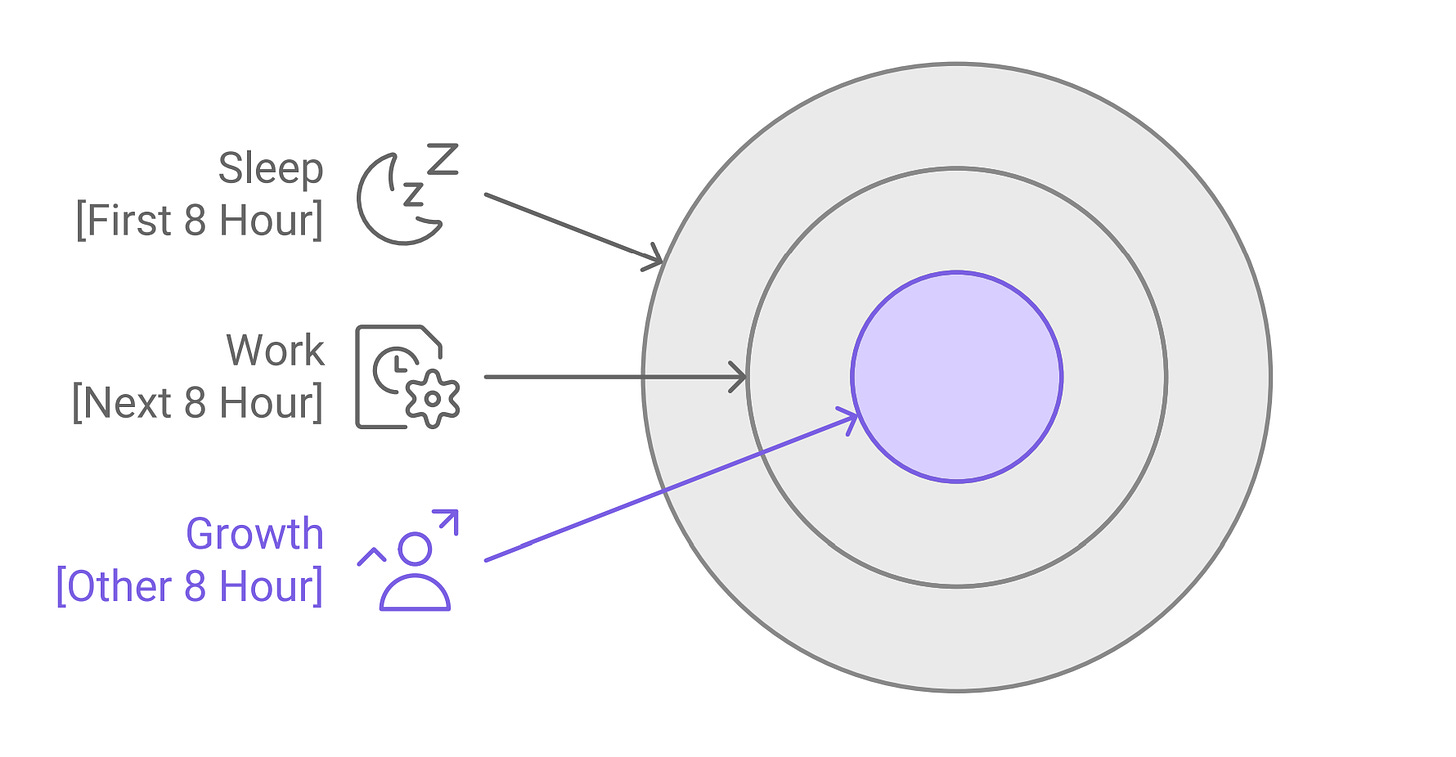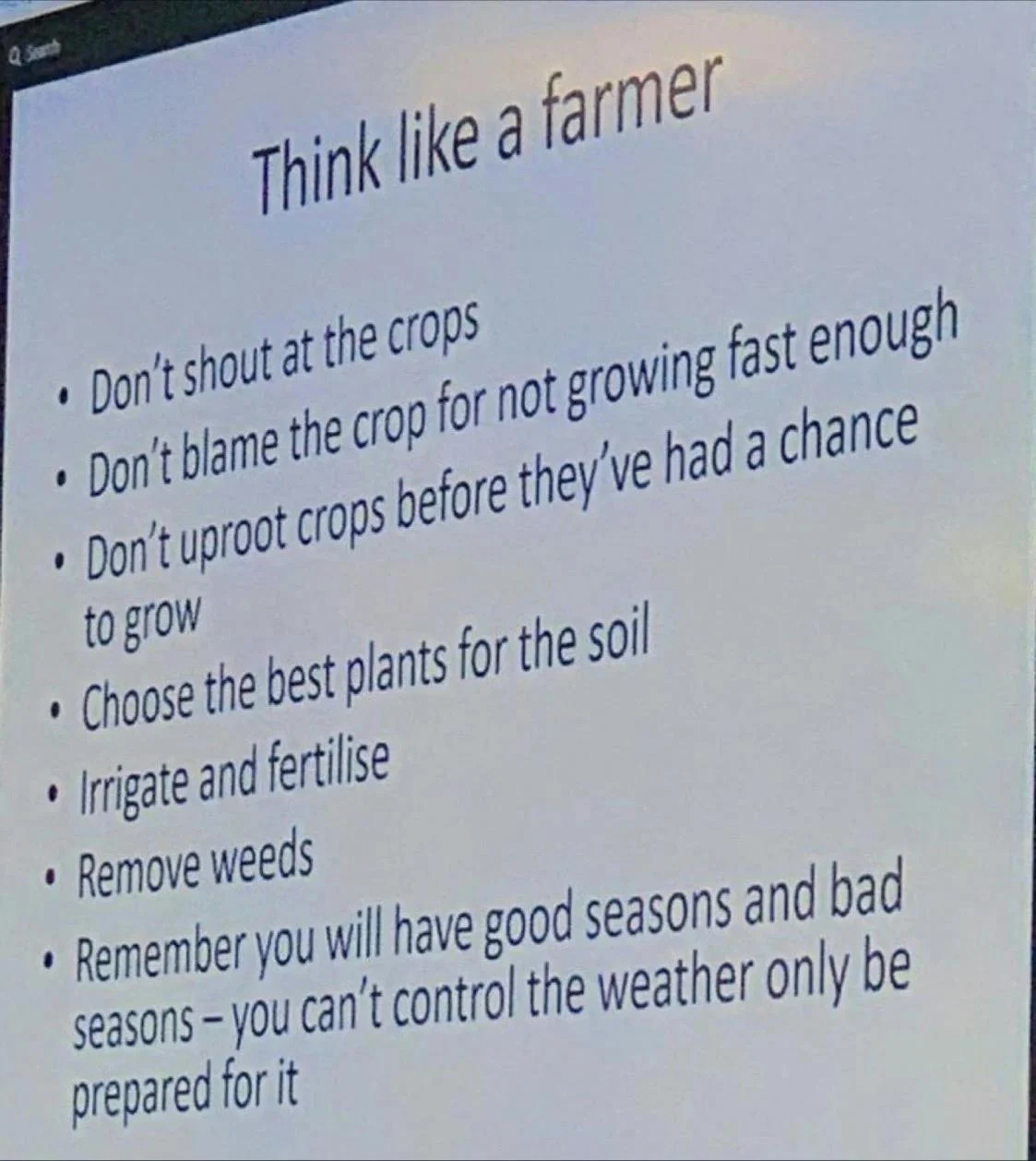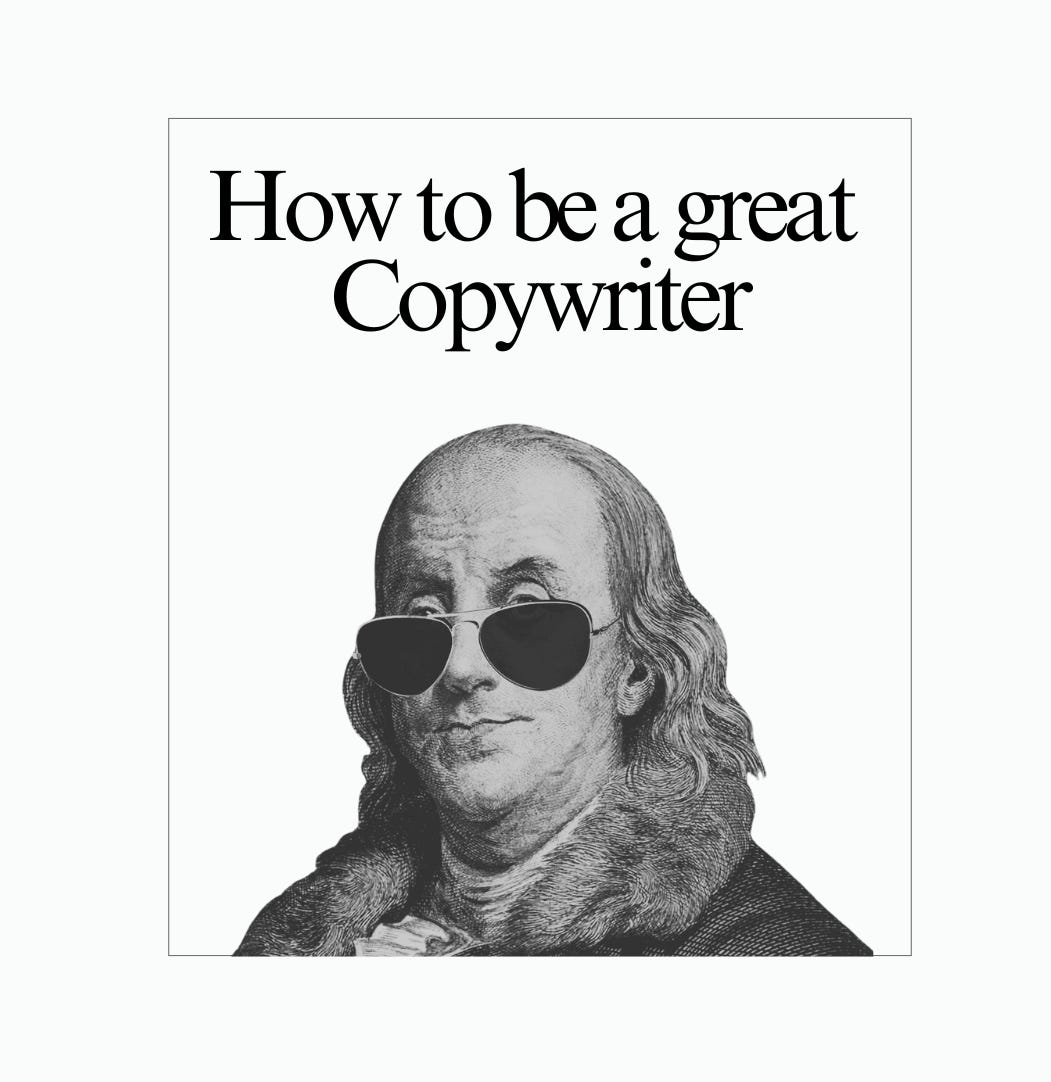How We’re Being Played by Our Screens 🤹🏾
Issue #113: What I Learned from The Social Dilemma (and What You Can Do About It). The other 8-hours. Think like a Farmer.
Welcome to Learn + Grow, where you will learn tips and tools that will help you be 3% more peaceful + productive in just 3 minutes a week.
💡 Here are 3-ideas to help you learn, grow, and be inspired this week!
🎓 Learn
A few days ago, I was watching The Social Dilemma (a Netflix documentary) with my in-laws. They were visiting us to help with our newborn (yes, it takes a village to raise a kid).
As we sat there watching, I couldn’t help but think about how much our lives—our time, our focus, our relationships—are quietly shaped by these little devices in our hands.
It’s crazy to think that a group of just 50 designers, working at major tech companies in California made decisions that now shape the lives of 2 billion people—controlling their time and attention as if orchestrating a global puppet show.
We all have been there. One quick scroll turns into an hour. You close the app, only to open it again a few minutes later. And then, just like that, you’ve forgotten why you even picked up your phone in the first place.
Why? Because the game is rigged.
The Social Dilemma—pulls back the curtain on the tech we use every day. It shows us how social media platforms (Twitter, Instagram, Facebook, YouTube, TikTok, etc.) and algorithms are carefully designed to grab—and keep—our attention. Spoiler alert: it’s not a pretty picture.
Here are the quotes that made me sit up straight, the lessons you can take away, and, most importantly, the practical steps you can take to reclaim your time and mental space.
Quotes That Hit Hard
This show is packed with mic-drop moments, but here are the ones that really stuck with me:
"If you are not paying for the product, then you are the product."
Yep, your attention is what they’re selling. And you’re giving it away for free.
"We’ve created a system that biases towards false information, not because we want to, but because false information makes the companies more money than the truth."
Drama = clicks. Clicks = cash.
"We live in a world where a tree is worth more financially dead than alive, and a person is worth more financially if they are depressed than if they are happy."
This hit me like a gut punch. Your struggles are profitable to someone.
"The algorithm doesn’t have a sense of purpose. It just follows engagement."
It’s not personal—it’s just math. But that math? It’s not on your side.
"The technology that connects us also controls us."
Think about it. Who’s really in charge here?
"We’re training a generation of people to be more focused on superficial validation—likes, comments, and followers—than on real connection."
And we wonder why anxiety and depression are on the rise.
"Fake news on Twitter spreads six times faster than true news."
Lies travel faster than truth. No wonder the world feels chaotic.
Key Lessons
Your Attention Is a Goldmine: If something is free, you’re the product. Social media is selling you to advertisers. Your time, your clicks, your data—it’s all on the table.
The Algorithm Doesn’t Care About You: It’s not evil. It’s just doing its job: keeping you engaged. The cost? Your peace of mind, your relationships, your health, and your happiness.
Misinformation Is a Feature, Not a Bug: Outrage spreads faster than facts. The system is built to amplify the noise, not the truth.
Mental Health Pays the Price: Social media thrives on comparison and validation. The more you seek approval online, the more vulnerable you become.
What You Can Do About It
Awareness is step one, but action is what counts. Here’s a simple list of steps you can take starting right now:
Turn Off Notifications
Those constant pings? They’re designed to pull you back in. Silence them.
Audit Your Time Online
Use tools like Screen Time (iPhone) or Digital Wellbeing (Android) to see where your time is going. Spoiler: it’s more than you think.
Unfollow Toxic Accounts
If it doesn’t inspire, educate, or make you laugh, hit that unfollow button.
Set Boundaries
Limit your social media time. Start with an hour a day and see how it feels. Delete social media apps from your phone.
Schedule Digital Detoxes
Pick a day—or even a few hours—where you go completely offline. No excuses.
Choose Real Connections
Instead of DMing a friend, call them. Better yet, meet up IRL.
Support Ethical Platforms
Look for tech that prioritizes privacy and well-being over profits.
Start Conversations
Bring these ideas into your circle. Share this blog, discuss The Social Dilemma with friends and family, and spread awareness. Check out more resources.
Watch this Show with Family
Spare 90 minutes this weekend to watch the documentary. Even better? Watch it as a family and start a conversation about how these issues impact everyone.
Final Thoughts
We’ve turned to social media as a pacifier, soothing boredom, loneliness, or discomfort with endless scrolling. But let’s be honest: is it really designed to help us? After watching this show, I’m pretty sure the answer is NO.
I’ve also seen the argument that social media platforms are also tools for productivity or creativity. But here’s the thing: a real tool doesn’t poke us every minute, demanding our attention. A real tool serves us—it doesn’t work against our will or interests.
The good news? We’re not powerless. We can take control of our attention, our time, and our lives. It starts with awareness, and it grows with action.
So, here’s my challenge to all of us: pick one action from the list above and start today. Not tomorrow. Not next week. Today.
Our time is worth it. Our peace of mind is worth it.
Let’s take back control, one mindful decision at a time.
What’s the first step you’re taking? Let me know in the comments—I’d love to hear from you.
🚀 Growth Tip
Our day breaks into three 8-hour slots:
1. Sleep (8 hours): No matter who we are—billionaire, parent, or student—sleep is non-negotiable. Even the most successful people need it to recharge.
2. Work (8 hours): Work comes in many forms. Whether we’re employed, running a business, managing a household, or pursuing passion projects, this chunk of our day is all about work and responsibility.
3. The Other 8 Hours: This is where the magic—or the monotony—happens. How we spend these "other 8 hours" can define the quality of our lives. If we’re not intentional, it’s easy for them to slip away:
2 hours playing video games
2 hours scrolling social media or watching YouTube
Another couple of hours surfing the internet
More time eating, chilling, and watching TV
Instead, we can use these ‘other 8 hours’ to Learn + Grow:
2 hours learning: Pick up a skill—reading, coding, writing, public speaking, or a new language.
1 hour on health: Yoga, walks, workouts, or sports with friends.
3 hours socializing: Quality time with family and friends.
1 hour solo time: Meditation, journaling, reflecting, or recharging your mind.
1 hour creator time: Use this time to build a side business, build an audience, a tool, etc.
How we use the "other 8 hours" is what separates a life we love from one we merely tolerate.
The choice is ours: let them slip away passively or fill them with purpose, growth, and joy.
🤩 Inspiration
There are a few awesome life and work lessons we all can learn from farmers.
The last one is my favorite: "Remember you will have good seasons and bad seasons—you can't control the weather, only be prepared for it.”
[On a different note, here’s something I’m excited to share to help you boost your productivity and performance through better writing in 2025]
How Samir, an Engineer, Transformed His Career with One Skill
Samir wasn’t a writer. He was a software engineer, great at building things but struggled when it came to explaining ideas, pitching projects, or sharing updates.
After being passed over for a promotion, he realized something: It wasn’t his technical skills holding him back—it was his writing.
He signed up for a copywriting course, thinking it would help him write better emails. (It did that and more.)
In a few months, Samir’s emails were clear and persuasive. His project proposals got approved faster. He became the go-to person for internal presentations. And, yes—he finally got that promotion.
Why? Because writing is a meta-skill.
Whether you’re an engineer, designer, accountant, or manager, writing impacts everything. Emails, reports, pitches, presentations—good writing makes you more productive, more effective, and more valuable.
Here’s the good news: WRITING IS A SKILL. You don’t “have it”, you learn it.
If you can improve only one skill in 2025, make it writing.
I’ve spent over $5,000 on different writing courses, and out of all of them, I highly recommend CopyThat—an email-based copywriting course you can complete in just 30 minutes a day for 10 days.
✍🏻 Check it out here: CopyThat
👋 Until next time, Anil / CEO and Co-Founder of Multidots, Multicollab, and Dotstore.
FYI…I also write about agency growth and Enterprise WordPress.
May the Peaceful Growth be with you! 🪴

